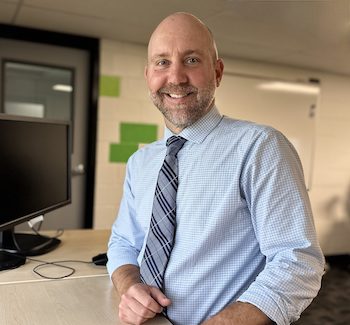Jason Bing, director of capital programs for Ann Arbor Public Schools, has been named one of 10 recipients of the 2024-2025 School Sustainability and Air Quality Fellowship by the Center for Green Schools.
Throughout the upcoming school year, the 10 fellows selected from across the country will benefit from peer networking and resource sharing; in-person and regular virtual training, including at the Green Schools Conference; and individualized coaching to support their achievement of professional goals. They will build their technical knowledge and skills around the nexus of energy efficiency and indoor air quality best practices, learning from each other, peers in the field and industry experts.
These fellows were chosen because they and their districts have demonstrated dedication to creating healthy and sustainable schools. They collectively bring experience in implementing energy efficiency programs, green building design and operations, and environmental health management across large school systems.
We asked Bing a few questions about this new opportunity:
Q: Why did you apply for this fellowship?
A: I’ve been following the great work of the USGBC’s Center for Green Schools for some time and was recently made aware of this opportunity. The fellowship offers funding and resources for exceptional training and technical assistance programs to support Sustainability and Indoor Air Quality initiatives for our students and staff.
Q: What do you hope to learn?
A: So much! Often, just being given a chance to speak with other district representatives, some much larger than ours, about the way they have creatively problem-solved or addressed certain aspects of sustainability can level up our approach and avoid creating similar “lessons learned.”
In particular, I hope to learn how other districts have navigated the important conversations around trade-offs and decision analysis for solutions that may solve/address one issue but create or impact other issues regarding sustainability, health, and indoor air quality. One, if we increase ventilation rates and bring in larger volumes of outside air, how do we offset the increase in carbon/energy costs?
Q: How will this experience benefit the district?
A: The USGBC’s Center for Green School’s mission and objectives closely align with those outlined in the AAPS Environmental Sustainability Framework. I believe the information and resources gathered and shared through this experience can make a significant impact for our students.
Q: How can we meet our AAPS environmental sustainability goals in a resource-constrained environment?
A: Thankfully, our community has invested in this district, and utilizing our capital program funds (which are separate and distinct from our operational general fund), we can continue to invest in healthy, high-performance building upgrades to support our students and staff. Energy efficiency improvements, adding rooftop solar arrays, investing in geothermal technology, and transitioning buildings to an all-electric HVAC system can create cleaner, healthier and lower carbon school buildings for the AAPS. Furthermore, identifying opportunities like this USGBC fellowship, grants, incentives, etc., can help our local community investments go even further.
Q: Anything further you’d like to say?
A: Though the challenges of running a public school district are immense and resources can be limited, we must continue to find ways to support the health and well-being of our students and staff now and into the future through our commitment to environmental sustainability and healthy schools. This is one way to keep focused on the task at hand: serve the students and staff of AAPS!






